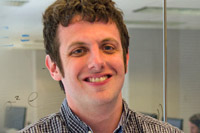PORTER ’02 USES BIG DATA TO ADVISE POLITICAL CAMPAIGNS

Dan Porter ’02 knows how you’re going to vote next November.
 If that’s a shock, then welcome to the world of big data. Google knows what ads to give you, Netflix knows what shows you like to watch, and your credit card company likely knows more about your buying habits than you do. A wealth of data points to your voting preferences.
If that’s a shock, then welcome to the world of big data. Google knows what ads to give you, Netflix knows what shows you like to watch, and your credit card company likely knows more about your buying habits than you do. A wealth of data points to your voting preferences.
Of course, you may be genuinely undecided, or open to changing your mind, or lukewarm about the prospect of voting at all. That’s where Porter’s work gets interesting.
He and his colleagues who founded BlueLabs in the spring of 2013 are veterans of the 2012 Obama campaign. They famously used data analytics to direct campaign resources—television ads, email, door knocking and the like—toward getting out the vote and winning over persuadable voters. Their approach was efficient and highly targeted, based on an understanding of which data points, among a sea of information available about voters, are useful and predictive. At the outset of the campaign, however, not everyone was sold on their approach.
“There were a fair number of skeptics in 2011, and we had to work hard to win them over,” Porter recalls.
The names of registered voters are public, as are date of birth, party affiliation (in some states), and the names of other registered voters in the household. The innovation developed by Porter and his colleagues has been to marry that data with consumer data collected by various marketing companies: a vast trove of information on each and every one of us.
Do you own a hunting or fishing license? As it turns out, that information is politically significant.
The staff of BlueLabs takes this information and synthesizes it into a single predictive score, what they call the “Candidate Support Model.” In the Obama versus Romney race, for example, a score of 91 would have meant the voter had a 91 percent chance of voting for Obama.
BlueLabs, which is avowedly progressive and aligned with the Democratic party, is credited with playing a significant role in helping both New Jersey Sen. Cory Booker (D) win his seat and Virginia Gov. Terry McAuliffe edge out his Republican opponent.
In the current election, BlueLabs is assisting the Clinton campaign, but also working with various down-ballot candidates. They help candidates refine their messages for various venues and to determine who might be persuadable – and how.
One anecdote from the 2012 national campaign, which Porter believes to be true, tells of a Romney campaign worker diligently but not very efficiently knocking on every door in a particular city block. Meanwhile, an Obama campaigner, who was armed with data about the residents of the block, knocked on only two doors – those of individuals who might be influenced.
“Big data helps to inform a lot of door-to-door conversations,” says Porter, who is head of data science for the firm.
Their analyses of voter proclivities has also taught them that in the absence of some seismic event that alters a campaign, voter preference doesn’t change much.
“I’ve observed that races tend to be a lot more steady than many public polls and the media let on,” he says. “Our modeling was remarkably steady throughout 2012. Unlike a lot of public opinion polls, we didn’t see much fluctuation.”
Porter’s path to big data analytics has had interesting zigs and zags. He had an early taste of statistics when he tallied up game stats for his father, a high school baseball coach. At Wesleyan, he pursued a senior thesis in the College of Social Studies that relied on statistics and data analysis, even though he had not acquired much background in this area.
After graduation, he played poker professionally for a couple of years and obtained a master’s degree from Columbia University in quantitative methods. “My mother was much happier to tell her friends that I was working on Obama’s campaign,” he says. Always a self-described “political junkie,” he says political campaigns provide “awesome, fascinating data.”
Campaigns are also an all-out effort. In 2012, Porter worked literally every day from February through the November election. That’s not sustainable for an ongoing business, and the staff of 37 at BlueLabs works more customary hours with diversified clients, including retail firms trying to get a better understanding of the behavior of customers.
The firm’s predictive models also identify the likelihood that an individual will donate to an organization, procure a service, and more. The guiding principle is to help clients determine who is most likely to be persuaded to act.
Federal and state government also presents an opportunity for growth because government interacts with individuals all the time. BlueLabs has worked, for example, with the city of Camden, New Jersey, to study health outcomes.
“We can take a holistic view of the data out there and help cities tie it together to serve their citizens better,” he says.
